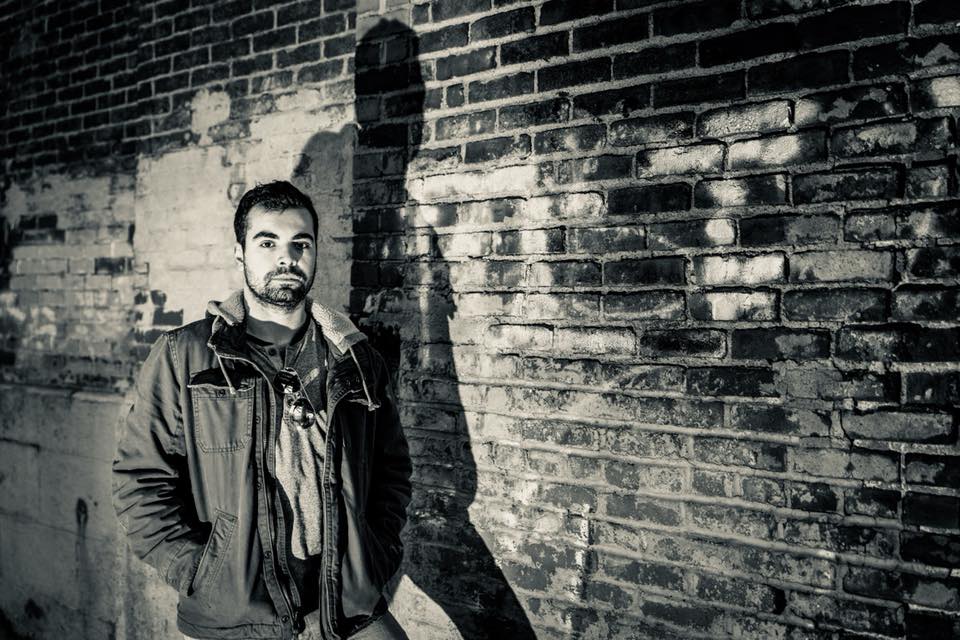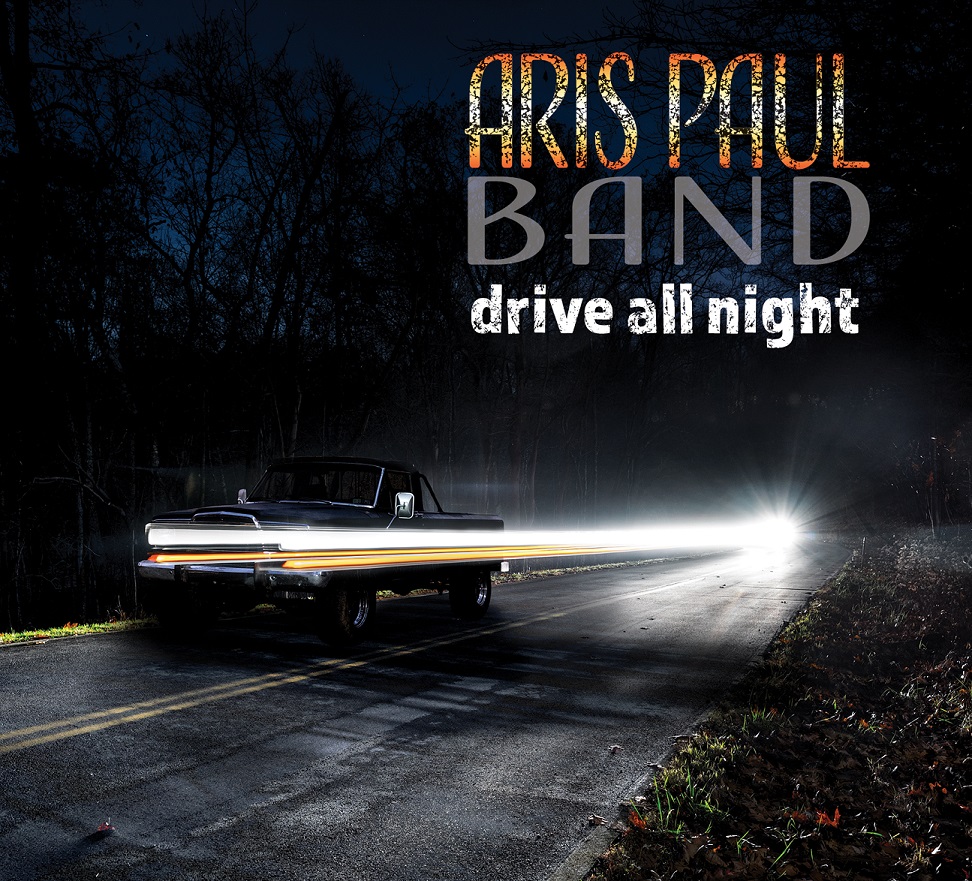While Starship Mantis rocked the Stage at Karma’s Grand Opening on the night of March 2nd, another accomplishment was being celebrated a few blocks down the street. Instead of elaborate costumes and funky sax solos, the musicians at Club Café opted for button-downs, bandanas, and soulful guitar riffs. The event in question was a sold-out release show for Drive All Night, the first full-length record from local alt-country/southern-rock outfit, Aris Paul Band.
You may have seen them play with Bindley Hardware Company and Some Kind of Animal in 2017, as part of the “Pittsburgh’s Very Own” Showcase Series at Mr. Smalls. Maybe you’ve heard them on the radio—they’ve recently been featured on 91.3 WYEP, 102.5 WDVE, and 97.7 in Butler. Or maybe you’re entirely unfamiliar. If so, you should consider changing that. Drive All Night is an album packed with instrumental prowess, brutally honest lyrics, and undeniable heart.
In the liner notes of the physical CD, Paul gives his sound the moniker “red-eyed road music,” which he describes as encompassing “a range of roots-rock, blues, funk, alt-country, soul, southern rock, folk,” and “anything else that’s good for building momentum and carrying on down the highway.” Fans of Lynyrd Skynyrd, The Marshall Tucker Band, Paul Luc, and their ilk will find plenty to like here.
True to its title, life on the road for a traveling, struggling musician is a running theme throughout the record. It begins with the sound of a car engine starting up and driving away, and ends with the sung line “Keep on rollin, on and on and on and on and on…” in a song called “Rambler’s Creed.” References to neon lights, endless highways, cheap motels, smoky rooms, and sleepless commutes pop up repeatedly. So too do the nomadic emotions that accompany these nomadic tendencies—intense excitement and intense exhaustion; self-affirming passion and self-interrogating introspection; body-damaging habits in a soul-healing pursuit. As Paul himself put it to me, the record “explores wanderlust both as a romantic notion and a mental illness.”
Considering his extended musical background in multiple cities, these trains of sonic and lyrical thought make sense. His dad was a touring blues guitarist in the 70’s and 80’s, and together with his uncle opened up Excuses Bar & Grille, a groundbreaking blues club in the South Side. “I feel really fortunate in that I’ve always been around the blues/music scene,” he explains. “…It was just what my family did. It was just another workplace – only with a lot more neon lights, smoke, and music.”
Paul himself picked up a guitar at age nine, and the rest is essentially history. “Years ago, I worked for several studios as a songwriter/studio musician in Nashville and created several albums worth of material,” he says. “I ended up never releasing any of them. Actually, legally I couldn’t…the label shopped these songs around to bigger, radio-friendly artists. It turned me off to the songwriting scene [there.]” He continues, “I came back to Pittsburgh with the intent of playing guitar for other bands and not much else. And that’s what I did for several years. I never stopped writing songs, though, and eventually I built up a new collection that I couldn’t be prouder of.”
There’s quite a bit to be proud of. Paul’s guitar work throughout the record is impeccable. From multiple layers of searing, overdriven electric riffs to light, pretty acoustic fingerpicking (and all the shades of intensity in between), his instincts are sharp and his jams are impressive. He plays with both precision and soul; it’s technically remarkable and genuinely moving. The album is a longer one—twelve tracks clocking in at just under an hour—but the musical flow is so adept both within and between songs that you rarely ever feel like it’s dragging. This energetic give-and-take was no accident. “[Drive All Night] never stays in one vein for too long,” says Paul. “It wanders around and covers a lot of ground. And I believe those dynamics are everything to keeping someone listening…one minute you’ve got screaming, twin guitars leads and the next, relaxed electric piano alongside pedal steel.” He summarizes, “It allows the album to breathe and, in my opinion, gives it multiple high-water points throughout.”
Those points aren’t achieved by Paul alone, though. The band on Drive All Night consists of Aris Paul on lead vocals and guitar, Keith Quinn on electric bass and backing vocals, Ryan McMasters on electric and upright bass, Cory Caruso and Alex Peck on drums, Pete Freeman on pedal steel, Andrew Hendryx on mandolin, and Justin Bechak on keys. Quinn and Jesse Naus produced and engineered the record at Red Caiman Studios.
Each musician holds their own: energetic percussion that uses every part of the kit; brooding, emphatic bass that adds lovely depth; and the seamless incorporation of gorgeous pedal steel and key parts throughout the album. “I fell into the right crowd of studio musicians and engineers at Red Caiman, and they’ve become like family in the process.” says Paul. “I’ve been very fortunate in that I’ve been able to share this project with some incredible local artists and dear friends who really help take it to another level.”
Three additional local musicians make guest appearances on one song each. Bill Toms (of Hard Rain fame) sings on “Radio,” Madeline Rae sings on “Come & Go,” and Johnny Rooster plays the harmonica on “You Can’t Fix Lonely.” These collaborations are all successful. Toms’ seasoned, gritty vocal tone speaks to the song’s story of a long-struggling musician with big dreams: “’Cause I’ve been paying my dues/and I keep dreamin’ of the day/when I might see it through/When you’ll hear me on the radio/singin’ my songs/You’ll hear me on the radio/before too long/You’ll hear me on the radio/doin’ all right/A new club, a new town every night.” Rae offers her pretty, soulful voice (with a distinct country twang) to a love song about escaping the mundane: “And I just wanna take you somewhere we’ve never been/Where you and me can run free, oh like the wind/Let’s get lost somewhere and forget how to make it back/Chase that midnight moon until we run out of gas.” It would have been even better if she and Paul had experimented with harmonies, in addition to the octaves and call-and-response dynamic they did use. And Rooster’s excellent harmonica playing makes for a rollicking, fantastic old-fashioned track. It’s punchy and fun, providing a burst of energy at just the right moment. It’s also the perfect companion for some of Paul’s most biting lyrics yet: “Now tell me/why would such a bad bitch need so much sympathy?/Halfway out the door, you already need more company/You can’t fix lonely/Girl, that’s something you’ll always be/I ain’t gonna sit around and let you be lonely with me.” All of these tracks take place in the record’s latter half. This is the perfect time to shake things up a little, showing Paul’s keen instinct for flow.
Overall, the album moves well between rollicking, high-energy tracks (like the opening “Guitar Man” and “You Can’t Fix Lonely”); measured midtempo numbers (like the fittingly penultimate “Home”); and lilting, slower songs (such as ““Bad Habits, Bad Luck,” a personal favorite.) Paul’s vocals take on a country, slightly nasal twang, with casual pronunciations and appealing grit when the moment calls for it.
To review every moment that stood out to me would turn this into even more of a novel, so I’ll just go over a few of the highlights. “Guitar Man” provides a fun, energetic start to the album, and sets up recurring sonic and lyrical themes. It also includes one of my favorite lines: “Empty pockets and a broken heart/I keep thinking one day I might be safe/…Yeah, fuck that, I’d rather get paid.” “Wheels” blends foot-tapping percussion, painfully honest lyrics (“The saying goes, it’s not you it’s me/Well it turns out I hate the man that I turned out to be/I can’t face just who I’ve become/I can’t run, well I can’t run/…under them wheels”), and a killer overdriven guitar solo that gets steadily faster, building tension and energy to musically mirror the increasing speed of a car. Pedal steel takes the instrumental lead in the title track, to lovely effect. You might expect this song, if any, to be fast and rollicking. But its mellow, occasionally mournful sound is a gorgeous surprise, and is perfectly placed at track #6. Both the extended, immersive instrumental outro and the key solo in “Play” are fantastic too. This helps balance the comparatively literal/surface-level lyrics about the comfort and escape found in playing a guitar.
The final three songs all work well together to provide a satisfying conclusion, but my personal favorite is “Fast Track.” It’s an ode to someone the speaker cares about and sees heading down a questionable path: “You’re on the fast track to never comin’ back/Fast track to losin’ everything you have/Fast track to livin’ all alone/or are you just heading home?” The contrast between its upbeat percussion and otherwise soft, pretty instrumentals is appealing, and Hendryx’s mandolin really shines here. What struck me most, though, was the lyrical progression. In the bridge, the speaker acknowledges his role in this situation: “And I’m sorry I won’t be there/in your time of need/I don’t know who’ll bear witness/I’ll pity you/I pity me.” In the final chorus, the “you” briefly changes to “we.” This is skillfully done, and heartening. It shows that despite previous songs’ insistence on an inability to change or break bad habits, growth and productive introspection is still possible. Paul and company might be driving all night, but they’re heading towards a new sunrise.
“I am proud to say that this album is exactly who I am both as a songwriter and a musician,” says Paul. “It’s been a very long process creatively—some of these songs go as far back as five years, while others are so recent, they were added during the recording process.”
“But I’ve learned a lot of things along the way,” he concludes. “And I think that now everything is starting to fall into place for the first time in a while.”
I’m inclined to agree. Give Drive All Night a listen and see if you do, too.
The album is now available on most electronic music platforms, including Spotify, iTunes, Pandora, and CD Baby. Keep up with Aris Paul Band on Facebook to find out when they’ll be playing at a venue near you. You can also find their website here.










